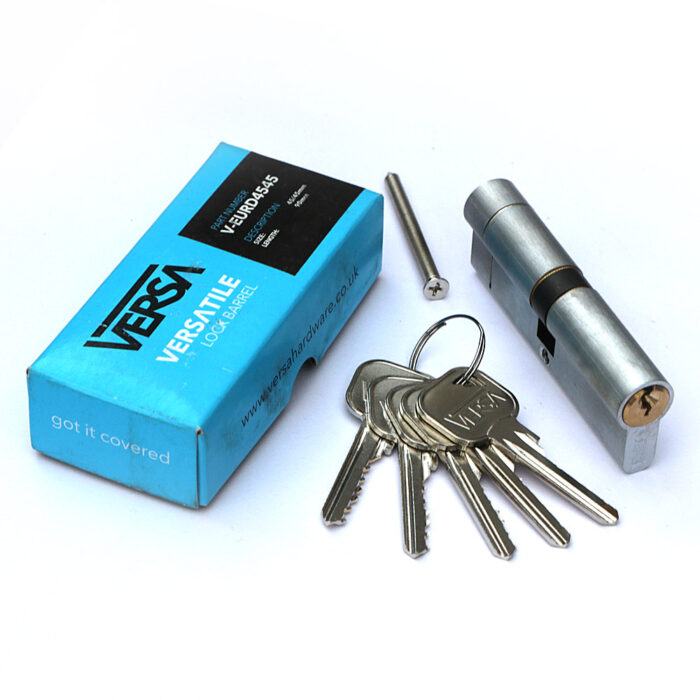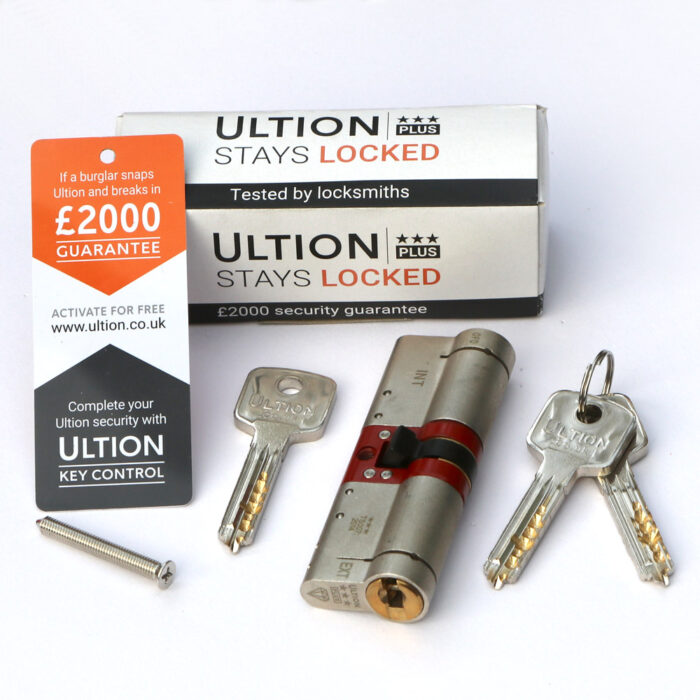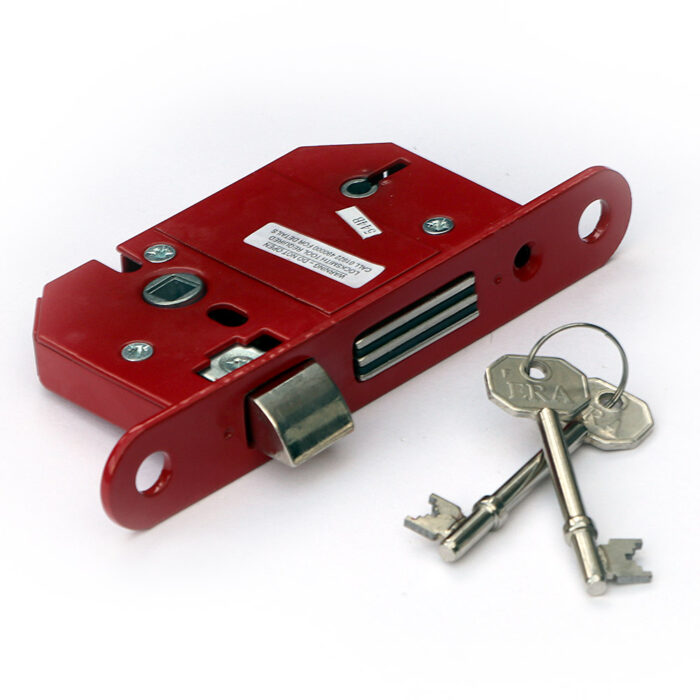Advice on the four types of common door locks
With so many different types of locks on the market, it sometimes can be hard to choose which door lock type is the best. Often home insurance providers will ask you to disclose what lock type you have on external doors; dependent upon which type you have could provide you with a saving on your insurance. In this guide we’ve put together some tips, advantages and disadvantages on each lock type, along with features and uses.
Standard Euro Cylinder door locks
 Euro Cylinder locks are a common type of lock found on front and back doors, generally they are used on uPVC doors in conjunction with a multi-point locking system. This cylinder uses a pin and tumbler system with a key to align the internal pin set.
Euro Cylinder locks are a common type of lock found on front and back doors, generally they are used on uPVC doors in conjunction with a multi-point locking system. This cylinder uses a pin and tumbler system with a key to align the internal pin set.
Doors commonly fitted to:
- External front doors including uPVC, composite & wooden
- External back doors including uPVC, composite & wooden
- Internal doors – not frequently used in homes but can be used in businesses and in environments such as schools and hospitals
Advantages of a Standard Euro Cylinder lock
- Easy to replace – Euro cylinder locks are generally easy to replace or repair despite them being paired with a multi-point locking system. This means you can replace just the euro cylinder if it becomes damaged or faulty saving you money and time.
- Good security – There are a range of different models available on the market with some good security to help prevent from common techniques used by burglars such as lock snapping, drilling or picking helping to secure your home. Another great benefit is that some models can be restricted so that only the owner can request new copies of a key be made, giving you further peace of mind, your property is secure.
- Ideal for commercial use – These cylinders can be keyed alike so that one key can work for multiple cylinders. This makes them an appealing option for use in office buildings & schools, where there are multiple internals doors that may need securing.
- Adaptable – If required euro cylinders can be easily changed to different cylinders to give your home a higher level of security with a better lock. Additionally, they can be adapted by a professional locksmith, to have an internal thumb turn from the standard keyway on each side for easy internal operation.
Disadvantages of Euro Cylinder locks
- Vulnerability – The main disadvantage highlighted by many locksmiths is the euro cylinders vulnerability to a technique used by burglars called lock snapping. Using this method, a burglar is able to gain access to a property pretty quickly & with somewhat ease. All it takes is physical force alongside some makeshift tools to break in. If the right amount of pressure is applied to a euro cylinder lock, the outside becomes weak allowing it to be removed which then exposes the mechanism, this is then tampered with to gain entry.
Build your own Standard Euro Cylinder lock package.
3-Star Euro Cylinder door locks

A 3-star euro cylinder lock is another type of euro cylinder that conforms to British Standard meaning your lock will protect against all the known lock snapping techniques, as well has having protection against lock bumping techniques. 3-star euro cylinder locks are often referred to as Anti Snap locks. Anti-snap locks are high security euro lock cylinders that are designed and tested to protect against lock snapping, stopping a thief from breaking the lock into two parts.
3 Star cylinder locks explained
The TS007 3-star cylinder is independently tested by BSI and awarded the British Kitemarked TS007:2014 3-star accreditation. The TS007 3-star lock refers to a euro cylinder that has been subjected to an attack test, in addition to the testing performed on a one-star cylinder. The police recommend TS007 3-star locks for any home or business premises.
Doors commonly fitted to
- External front doors including uPVC, composite & wooden
- External back doors including uPVC, composite & wooden
Ultion 3-star euro cylinder locks
Ultion are the UK’s industry leading security brand; one of the best cylinder locks on the market is the Ultion 3-star lock. Approved by the police and achieving the highest Kitemark star rating, Ultion locks are also accredited to the Master Locksmith Association’s high standard; Sold Secure Diamond. Official Ultion installers such as professional locksmiths sell, install and repair Ultion locks. Ultion locks are designed using stronger materials than what you get from your standard door locks, therefore can enhance your overall security.
Advantages of 3-Star Euro Cylinder locks (Ultion)
- Durable materials – Ultion locks are made from molybdenum which is a much denser material than iron. This means that it makes for a much stronger and more durable lock, that will not only outlast most locks through general wear and tear, but will also prevent burglars from breaking it.
- Accredited locking system – Ultion is an accredited brand which means that professional locksmiths have tested the durability and strength of the locks before giving it their certification of approval. Ultion has been awarded Sold Secure Diamond accreditation which is essentially the best certification a lock can get.
- Double locking security system – The double lockdown security system that is fitted within Ultion locks makes it highly preventable to burglary and core damage to the mechanism. A series of attack pins are released when the lock detects an attack on the core locking system.
- 3-star drill protection – The attack pins and the way that the lock is constructed protect it from drill attacks. This is a method that a lot of burglars are using as it works on a lot of standard locks. The 20 hardened steel and its lockdown mode make Ultion 3 star protected from drill attacks.
- Prevents against lock picking – An Ultion lock is secured by design. This means the mechanism is designed in a way that is an anti-snap, drill and pick system.
Disadvantages of 3-Star Euro Cylinder locks
- Price – Due to their incredible high security, 3-star euro cylinder locks can be expensive, especially if you are fitting them to multiple doors around your home. Due to the durability of these locks though it is a short-term investment that will bring you many long-term benefits.
Build your own 3 Star Euro Cylinder lock package.
British Standard Mortice door locks

Mortice locks are usually found on wooden doors and require a key to operate it. This type of lock is very common and often sits flush within the door and is constructed in a way where it allows for the mechanism to be easily taken apart to be serviced and maintained. Mortice locks work by entering a key into the lock, the key operates five levers that throw across a bolt into the keep that is fixed within the doorframe therefore securing the door.
Mortice locks can also be known as a deadlock or sash lock. Both of them have very similar operating systems, however one difference between them is the use of a handle that operates a latch within a sash lock. This allows you to close the door using the latch without having to deadbolt the door, with a deadlock in order to keep the door closed you must turn the key.
Types of mortice locks
It’s worth mentioning there are varying different types of mortice locks available, each one offering a different level of security:
Three-Lever mortice Lock
Often these locks are used for internal doors or garden sheds. This is due to the fact they are less secure because they have less levers which increases the risk of key duplication. These locks are often cheaper, making them an affordable choice. One of the main drawbacks to these types of locks is that they cannot be British Standard, this is because they do not have high enough security to pass the prerequisites to be British Standard approved.
Five-Lever mortice Lock
These locks are very secure making them ideal for use on external doors, they’re generally approved by home insurance providers for use on front and back doors. They have more levers so are trickier to pick the three lever, keeping your home more secure. When selecting a fiver lever mortice lock, ensure you choose one that is British Standard, this is the most secure and thief-resistant type of mortice lock.
Doors commonly fitted to
- External front doors wooden only
- External back doors wooden only
Advantages of Mortice Locks
- Lower risk of forced entry – Mortice locks are fitted to the door themselves; this can make it harder to force entry by lock snapping in comparison to standard euro cylinder locks.
- Can be adapted – Most mortice locks can be easily fitted by a professional locksmith and are available in a wide range of sizes. There is also a range of different finishes meaning you can choose the right hardware to suit your home.
- Very affordable – Due to the design, they are easily replaced, fixed, fitted and maintained making them a cost-effective choice.
- Home insurance compliant – So long as you opt for a British Standard mortice lock, this will ensure you are compliant with most home insurance policies minimum requirements.
Disadvantages of Mortice Locks
- Security – If you opt for a mortice lock that doesn’t withstand to British Standard, your home is less secure, and you may be breaching your home insurance policy. There is also no automatic locking option for mortice locks.
- Installation – If your door has a thickness lower than 35mm a locksmith will be unable to install a mortice lock.
Build your own British Standard Mortice door lock package.
Rim Cylinder door locks
A rim cylinder is a classic pin tumbler design which houses a series of different length pins that secure the lock in place. When the correct key is inserted, it can align all the pins allowing them to turn, this is what allows the lock to open. The rim cylinder is often used as the external operating system for the night latch.
A rim cylinder is part of a rim night latch system. Rim locks can be identified as they are the outer part of the lock that you use to open the door with a key. Generally, rim cylinders are found on wooden doors. Rim cylinder locks and mortice locks are both commonly found on wooden doors however the difference between the two is that a rim lock is fitted on the surface of the door, whilst a mortice lock is fitted in the door edge.
Doors commonly fitted to
- External front doors wooden only
- External back doors wooden only
Advantages of a rim cylinder
- Easy to use – Rim cylinders are easy to use and often can be upgraded to British Standard models, adding more security and meeting insurance policy minimum standards.
- Fairly affordable – As a rim cylinder and night latch work together, most assume that if one is changed the other one must be as well, however this is not the case. A professional locksmith can easily change a rim cylinder without affecting the night latch, this can save you money.
- Great variety – Rim cylinder locks come in different finishes; this allows you to select a finish that will blend with the rest of your home hardware.
Disadvantages of a rim cylinder
- Security – There are lots of models on the market & some don’t conform to British Standard therefore if a British Standard lock is not used rim cylinders can be picked with some ease. Additionally using a rim cylinder alone is not ample security and should always be used in partnership with a mortice.
Call SF Locksmiths for further advice
If you’re looking to replace or upgrade your locks give Stephen a call. With over 35 years’ experience we are well versed in all the different types of locks & can provide expert advice on the most suitable option for your door type and home security needs. To book an appointment call SF Locksmith Doncaster on 07990 573 857.